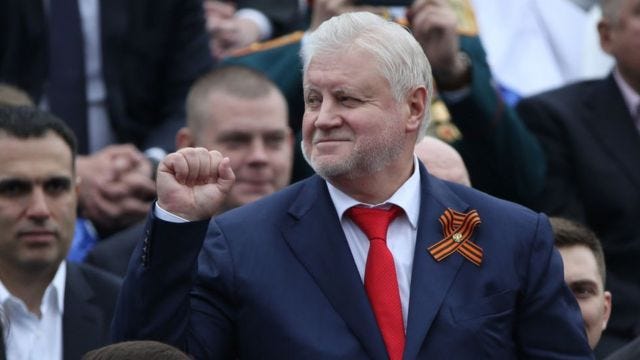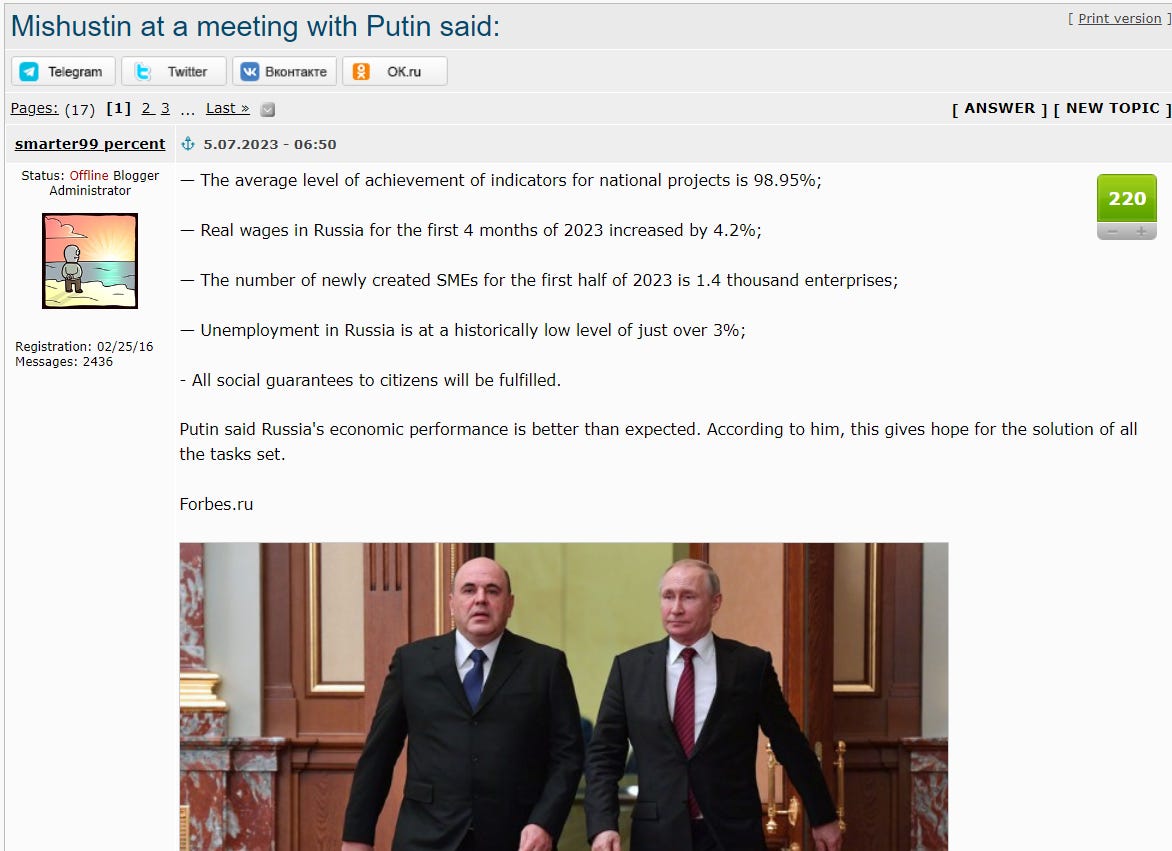
Is the Russian government downplaying the socioeconomic hardships of its proles?
This is the incendiary claim put forward by State Duma Deputy Sergei Mironov, the leader of the sometimes surprisingly uppity (but mostly pro-Uniparty) political faction A Just Russia For Truth. According to Mr. Mironov, Russia’s Federal State Statistics Service (Rosstat) has employed creative methods to “fix” the number of impoverished Russians at 9 million people—apparently forever.
Mironov wrote on his Telegram channel on Tuesday:
A huge number of people live in debt from paycheck to paycheck, take loans for the most necessary things. And then they save on the most necessary things, so that they can pay their debts on time—only so collectors do not come to torment them. But according to the reports, the bankers and financiers from the Government are performing well—the number of poor people is stable at 9 million, and the incomes of citizens are allegedly growing! This is a typical fraud and manipulation of statistics.
Harsh, bro.
Before I type another word I want to make it very clear that as an American I fully understand that the United States of Hamburgers is a cesspool of unconscionable poverty, and this blog post is in no way an attempt to portray Russia’s socioeconomic ailments as uniquely upsetting. That being said, Russia’s socioeconomic maladies are quite bad, and I would argue that just like in the United States, it’s very difficult to understand why poverty should exist at all in Russia—a country that, objectively, should be the wealthiest place on planet Earth. Well, there are many wealthy people with Russian passports, but for some weird reason their vast wealth never “trickles down” to the proles….
Your humble Moravia correspondent grew up in Santa Monica, California, which at least in his youth was the homeless capital of the United States, while also being a hub for very rich people with extremely fancy wives and condos and automobiles.
On my list of constructive criticisms of the United States of America, the country’s truly appalling wealth inequality, and its demonic mistreatment of those suffering from severe mental distress and/or substance abuse (anyone who falls through the cracks is treated like a 9th columnist rat), would have to be near the top.
I remember as a young Hobbit, full of piss and vinegar, waltzing down Montana Avenue as I tried to understand why Santa Monica’s fetishized beachside streets were peppered with homeless people in clear anguish. My mother once told me that many of these hurting souls were veterans with severe PTSD who were kicked to the curb after famous California governor-turned-Nicaraguan-cocaine-trafficker Ronald Reagan shuttered the state’s psychiatric wards. I don’t know if this is true, but it’s what I tell people when they ask me about Santa Monica, so let’s say it’s true.
A bit of a detour but I thought it was important to explain my feelings on this subject.
Back to Mironov. The Russian lawmaker warned the government in his Telegram rant that “the poverty of the population directly leads to its extinction,” and described the fight against poverty as “the second urgent task after the victory in the special military operation [in Ukraine].” Yikes.
Using Rosstat’s statistics, the number of poor Russians in the first quarter of 2023 decreased by 1.3 million, to 19.6 million people, compared to the first quarter of 2022. The poverty line is currently defined as households that bring in less than 14,000 rubles per month ($155 USD).
Mironov has been expressing his displeasure with these official statistics for a very long time. As Nakaunue reported on June 9 (“Mironov does not believe in poverty reduction according to Rosstat”):
Mironov is confident that another “victory” over poverty has been won exclusively on the “fronts of statistics.” Since 2021, Rosstat has been applying a new methodology for calculating poverty, as a result of which it is seasonal. In addition, it is estimated according to an obviously underestimated indicator—the “poverty line”.
“For the whole of last year, [the poverty line] was 13,545 rubles, in the first quarter of this year—14,026 rubles. If a person earns 14,027 rubles, he is no longer considered poor, which distorts the picture of poverty in the country. And the Government can use the data of the subordinate Rosstat for positive reports,” Mironov wrote.
According to the calculations of his faction, at the end of 2019 the real size of the consumer basket exceeded 31 thousand. This is the real poverty line, but the Government does not need such statistics.
Mironov’s displeasure with the “official” poverty statistics is nothing new, actually. He was making similar comments exactly one year ago:
“It turns out that people’s incomes are constantly falling, while the number of the poor is declining. What kind of miracles are these?! This socioeconomic phenomenon can only be explained by the ardent desire of Rosstat to show pleasant numbers, and the achievements of the agency’s bosses from the Ministry of Economy,” Mironov wrote.
According to the Rosstat report, in the third quarter of 2022, the poverty line was 13,688 rubles.
“Try to live on less than 14,000 rubles! It's not even poverty anymore, swindlers, but real poverty, in which more than 15 million of our fellow citizens live!” Mironov said. […]
When determining the poverty level, Rosstat uses the “poverty line” parameter introduced by Decree of the Government of the Russian Federation No. 2049 dated November 26, 2021. It corresponds to the value of the consumer basket in the fourth quarter of 2020, taking into account inflation.
Mironov is sure that its composition is “long and hopelessly outdated,” but Rosstat is interested in such a beggarly consumer basket, because the smaller it is, the fewer the poor.
Look: I’m not going to act as if everything Mironov is saying is 100% true, but he’s clearly tapping into deep populist sentiment, which is almost certainly based on some kind of Truth. And as far as I can tell, many Russians are not convinced that “everything is going according to plan” with the economy (however, it’s important to acknowledge that after 10,000+ sanctions, things could be a lot worse).
I am basing this analysis on anecdotal evidence—including “off-the-record” conversations with some Russians I know in the Regions.
But, for example, here is a recent thread on popular internet forum Yaplakal, celebrating the Russian economy’s various positive indicators:
The top comment:
Again, I can’t confirm or deny that the Russian government is fudging its poverty statistics. All I can say is that Moscow has a long, proud tradition of manipulating numbers for its benefit.
My favorite recent example of this compulsive habit is when Putin issued his famous “May Decrees” in 2012. One of these orders stated that by 2018, Russia should record a significant reduction in mortality from diseases of the circulatory system, the country’s top killer.
Here’s what actually happened:
Regretfully, the initiative’s overwhelming success was soon besmirched by the federally-funded Russian Presidential Academy of National Economy and Public Administration (RANEPA). The institute released a report in February 2018 which stated that it was “necessary to analyze the correctness of statistical information coming from the regions and conduct a detailed analysis of mortality rates.” The document also called for greater accountability for officials who provide “false reports on the causes of death.”
Eventually, the obviousness of the scam became undeniable. In December 2018, Deputy Prime Minister Tatyana Golikova ordered regional governors to provide “a full justification” after it was determined that mortality from certain causes of death had been “underestimated.”
The health ministry, which had readily rubber-stamped the problematic figures, absolved itself of wrongdoing and said any issues with the data should be taken up with Rosstat, Russia’s Federal State Statistics Service. Despite its denials, Skvortsova’s ministry allegedly played an active role in the odious scheme, and even retroactively changed its mortality targets to better fit the fraudulent statistics to predetermined benchmarks.
The official acknowledgment of the scam created a sticky situation for the Russian government: who was to blame for all this nasty data manipulation? On October 14, 2019, Russian Prime Minister Dmitry Medvedev publicly accused the country’s regional governors of cooking their books.
“This is a lie in the truest sense of the word,” Medvedev said in October 2019, referring to Russia’s phony mortality rates.
So basically nothing has changed.
Just to be very clear: I think it’s very disingenuous of the Collective West to wet its diapers with crocodile tears about the sufferings of the Russian people, when Western sanctions do very little to inconvenience Russia’s Western-linked kleptocratic ruling elite, while making things needlessly annoying for proles who did absolutely nothing wrong.
But Moscow is almost certainly cooking its poverty books.
The End.
Support Edward Slavsquat? $38 for 12 months of Blog-Love. You know you want to.






Thank you, I read your blog constantly and your information and analysis are more truthful than others, so I expressed a situation that is truthful, thank you!
Здравствуйте,я позволю себе написать здесь на русском-без лишних слов скажу что живу я в городе Волгоград(Сталинград)в своем частном доме с женой и ребенком 14 лет,общий доход семьи составляет 35000 рублей,оплата за дом в месяц составляет 5000 рублей,на питание уходит в месяц 25000 рублей-остается НА ВСЕ ОСТАЛЬНЫЕ ЗАТРАТЫ В МЕСЯЦ-5000 рублей!!!Это честные цифры!!!Я делаю подработку в месяц 15000 рублей-я разбираюсь в электричестве и связи и благодаря этому получается делать подработки-основная моя специальность-ремонт газовых котлов в домохозяйствах-вот посчитайте и подумайте-хватает ли мне денег чтобы выжить!спасибо!